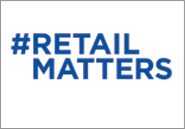Retail is the largest private sector employer in Newfoundland and Labrador.
Find out why #RetailMatters to Newfoundland and Labrador and #VoteRetail on February 13, 2021.
14%
of Newfoundland & Labrador’s workforce works in Retail. That’s 31,700 Canadians.
2,690+
storefronts in Newfoundland & Labrador
25%
of all retail employees work for small retailers.
$1.1 Billion
in total annual salaries paid
$24.14/HR
Newfoundland’s average hourly compensation in retail
$8.9 Billion
in Annual Retail Sales
Source: Stats Canada
Why Newfoundland & Labrador Retail Matters

Newfoundland and Labrador retailers have faced head-on the incredible and devastating financial challenges of COVID-19. If you have an opportunity to engage your local candidates, take time to share your experiences and view of Newfoundland and Labrador’s retail industry.
Be sure to also let candidates know that you are part of Newfoundland and Labrador’s largest private employment sector and that retail has a significant impact on the success of several other industries such as transportation, construction, property management, information technology, and financial services.
Here are some ideas that you can share with your candidates while spreading the word about retail:
- More than one in every ten jobs in Newfoundland and Labrador is in retail.
- 25% of all retailers employ less than 20 employees.
- Retail in Newfoundland and Labrador pays $1.1 billion in total annual compensation.
Every election provides the electorate with the ability to shape their government and help to ensure that future members of the House of Assembly understand the role merchants play in Newfoundlander’s and Labradorian’s lives and the economy.
Where the Parties Stand

Retail Council of Canada sent a questionnaire to the leading political parties addressing the key issues affecting retail in the province.
Retail Survey Questions
- Will your party pledge to work with the Retail Council of Canada to develop and implement a COVID-19 retail recovery economic strategy? For years, other industries have received government incentives for investing in people, technology and e-commerce.
- Is your party prepared to maintain the current model of determining annual minimum wage adjustments through a formula that is linked to CPI?
- Will your party pledge to not raise corporate taxes (small and large businesses) or the HST during your mandate?
- Will you take steps to ensure foreign eCommerce sellers begin to pay their fair share of taxes and eco-fees?
- Would your government provide refundable tax credits to assist with COVID-19 related store renovations and purchases of PPE in order to protect employees and customers in retail stores?
- Would your government be prepared to lead on issues related to environmental stewardship so as to avoid a municipal patchwork? (e.g. municipal governments taking action on single use plastic bags)
- Would your government take action to harmonize policies related to solid waste regulations across Atlantic Canada?
Retail Survey Responses from Parties
Develop retail sector strategy
Retailers are resilient and despite unprecedented challenges brought on by COVID-19, continue to fight to remain a viable and essential element of the province’s economy.
COVID-19 has created significant disruption to Newfoundland and Labrador’s retail sector. In 2019, the retail sector provided a $8.9 billion boost to the provincial economy and almost 29,000 jobs. Beyond COVID-19, Newfoundland and Labrador retailers are facing significant cumulative costs and competitive pressures. In the modern age of retail, there is no certainty of continued success as national, online, and offshore channels threaten brick-and-mortar Newfoundland and Labrador stores.
Recommendation:
- Work with Retail Council of Canada to develop a proper retail recovery strategy, commensurate with the size of the retail industry. While other industries have been the focus of sector strategies and incentives, the retail industry has long been overlooked. The ongoing costs stemming from the COVID-19 pandemic (including health order requirements) have only created increased pressure on the province’s retail sector. RCC is calling on the government to be a collaborative partner in finding solutions.

Maintain predictable minimum wage

Newfoundland and Labrador has established a predictable model for calculating annual minimum wage adjustments based on the Consumer Price Index. The approach helps ensure politics are removed from the process, and that minimum wage increases are balanced fairly between the interests of employees and employers. Newfoundland and Labrador’s model also mandates a review every two years to ensure that the province’s wage remains competitive within the country. Dramatic and rapid increases, such as those seen in recent years in Alberta and Ontario have been shown to harm opportunities for those with the least experience, especially youth.
Recommendation:
- Maintain the current CPI linked approach to minimum wage adjustments so as to ensure a transparent, predictable formula and adequate lead time for budget planning.
Maintain competitive tax rates and fees within the region
Competitive tax rates are an important tool for governments to attract and retain businesses. Newfoundland and Labrador’s commercial tax rates are competitive within Atlantic Canada while the province’s Harmonized Sales Tax (HST) is equal to that in the other Atlantic provinces. However, recent tax relief for both small and large businesses in neighbouring Atlantic Provinces suggest that Newfoundland and Labrador may be losing some of its competitive edge.
Businesses also deal with the annual burden of paying for the various fees charged by government. Individually, these fees do not generate a significant amount of revenue for government but they do create a negative impact for retailers across the province. Retailers understand that they need to be licensed in order to sell certain products. However, it can be frustrating when a small, rural retailer has to pay hundreds of dollars in licensing fees to meet demand for certain products from a small but loyal customer base. For some of the fees charged to businesses, the minimal amount of revenue received by the government does not outweigh the negative impact that such fees have on small businesses.
Recommendation:
- Commit to not raising corporate tax rate or the HST during your mandate.
- Commit to a review of the numerous fees charged on businesses.

Ensure eCommerce sellers pay their fair share

The pandemic has resulted in significant increases in online sales, primarily benefiting non-resident, foreign eCommerce sellers. Those retailers have lower property and labour costs than brick and mortar provincial sellers, and generally provide their employees significantly lower pay and benefits. They also do not employ Newfoundlanders and Labradorians. Many non-resident eCommerce entities sell into the province without paying eco-fees, yet the packaging for their shipments and products; as well as the products themselves at end-of-life, are discarded into our recycling system. Governments are currently paying these costs. However, should the province eventually move forward with an Extended Producer Responsibility (EPR) program for packaging, Newfoundland and Labrador’s brick-and-mortar retailers would be paying these costs on behalf of their competition. This process would ultimately subsidize foreign online sellers, from the United States, Asia and beyond.
Recommendation:
- Ensure eCommerce sellers from outside Canada pay their fair share of taxes and fees. Newfoundland and Labrador citizens and Newfoundland and Labrador retailers should not be forced to subsidize foreign eCommerce sellers who are taking a free ride on the backs of local businesses.
Provide refundable tax credits for COVID-19 related purchases
RCC commends the government for its efforts to support businesses during the COVID-19 pandemic. However, it should be noted that not all businesses have been able to access government support programs to assist them in remaining open.
One direct way that the Newfoundland and Labrador government can help support struggling small businesses is through the introduction of refundable tax credits to help lessen the cost impact of COVID-19 related store renovations and purchases of PPE.
Many local retailers, and the business community, are facing severe challenges and need urgent assistance. Tax deductions do not provide immediate help, whereas refundable tax credits would have a more beneficial impact. Ongoing costs tied to PPE equipment for staff, increased safety training, and other resources are necessary, but create a substantial expense at a time when finances are being squeezed. Refundable tax credits would provide substantial assistance in helping retailers create and maintain a safe retail environment for their employees and customers.
Recommendation:
- We urge government to use refundable tax credits, as a way to provide practical assistance to companies incurring eligible COVID-19 expenditures.

Provide provincial leadership on issues related to environmental stewardship

RCC commends the provincial government for finally taking a leadership role regarding single use plastic checkout bags. For a number of years, the provincial government’s refusal to provide direction regarding these bags, led to a confusing patchwork of local initiatives from municipal governments. Municipal action in areas of environmental stewardship that impact industry can lead to the creation of bylaws that are not harmonized with best practices in the rest of Canada. Such actions can needlessly create public confusion, administrative red tape and increased costs for businesses in the province.
Recommendation:
- With regards to environmental stewardship issues that impact industry, the government should provide leadership in taking action at the provincial level. Provincial action related to environmental stewardship should be harmonized with existing solid waste regulations and stewardship programs across Atlantic Canada.
1. Find your candidates
Use the Elections Newfoundland and Labrador tool to find candidates and their contact info for your electoral district.
Learn about your local candidates by visiting the party websites:
2. Print your sign
Show your pride in retail by posting a photo with your #RetailMatters sign or a photo of your store.
3. Tell candidates #RetailMatters
Use these links to send parties your staff photos or customized tweets.
- Green Party @nlgreenparty
- Liberal Party @nlliberals
- New Democratic Party @NLNDP
- NL Alliance Party @alliance_nl
- Progressive Conservative Party @pcpartynl
Contributing to political parties – what you need to know
Contributing to a campaign can be an effective way to build relationships with candidates in your riding.
Make sure that you understand the rules before lending your support to a provincial political party and its campaign. Here is a summary of things to remember:
Who can contribute?
Contributions can only be made by individuals or by corporations and trade unions individually (e.g. no contributions on behalf of an anonymous donor). There are no residency requirements.
What is the contribution limit?
There is no contribution limit.
How can a contribution be made?
Contributions can only be made to a registered political party, candidate or official agent of the political party or candidate. An individual is not considered a candidate until the writ of election is issued and nomination papers are filed.
Who can receive contributions?
Only a registered political party or nominated candidate may solicit, collect or accept contributions.
What are the restrictions?
An Official Representative cannot accept more than $100 in cash from any contributor in a calendar year.
Contributions above $1,150 are not eligible for a tax receipt. The Official Agent must provide a tax receipt for any contribution above $25.00. Any contribution above $100 is subject to the public record and must be made by cheque, money order or credit card, where the name of the contributor is clearly noted. Cash donations greater than $100 are not allowed.
Sections 282-289 of the Elections Act, 1991 Part III provide additional information regarding monetary and non-monetary contributions to political campaigns. View more information.
Section 47 of the Income Tax Act details the political contribution deductions. View more information.
Contact Us
 For questions or to find out more, contact Jim Cormier, Director, Government Relations (Atlantic) jcormier@retailcouncil.org or 902-422-4144.
For questions or to find out more, contact Jim Cormier, Director, Government Relations (Atlantic) jcormier@retailcouncil.org or 902-422-4144.


